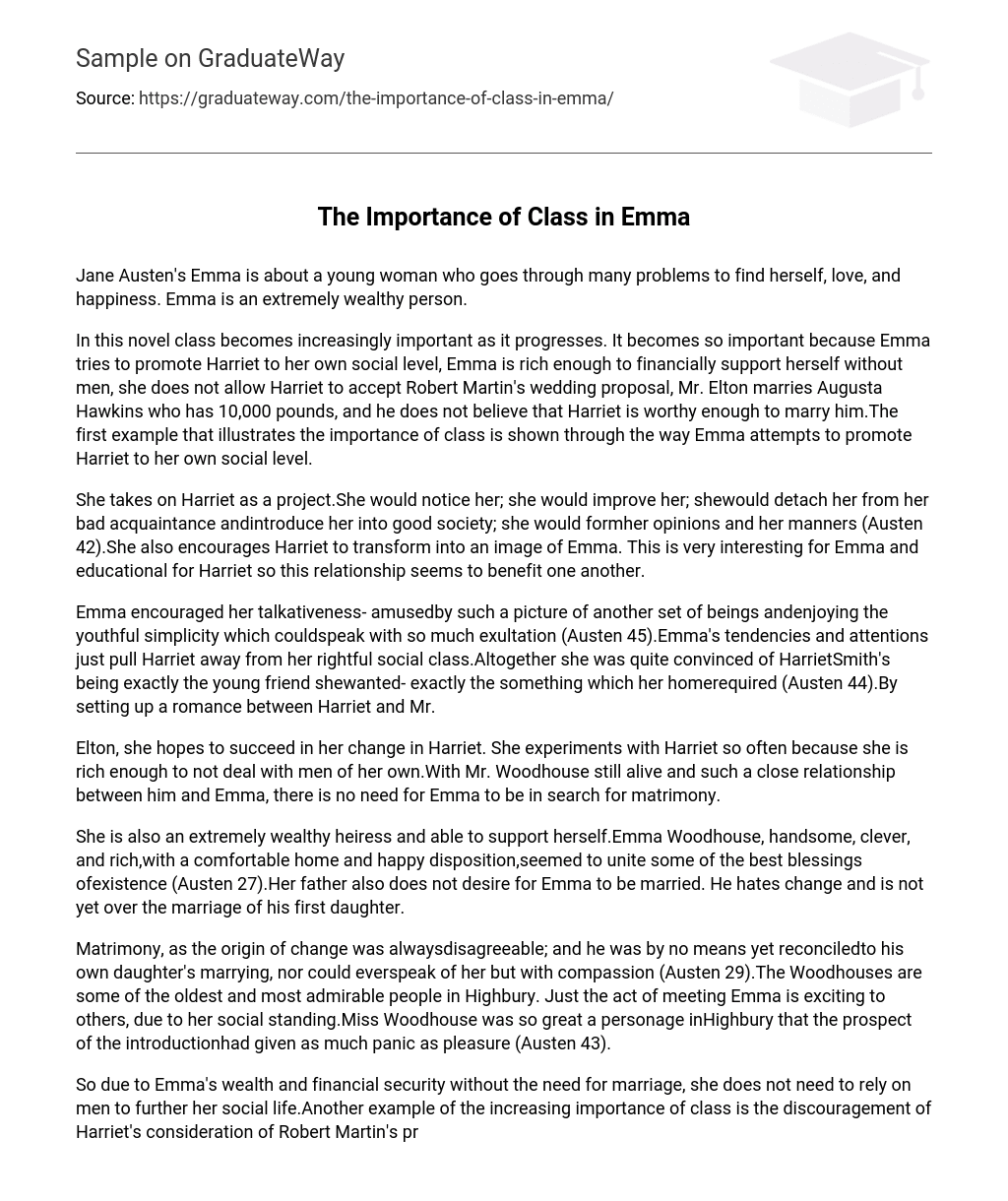Jane Austen’s Emma is about a young woman who goes through many problems to find herself, love, and happiness. Emma is an extremely wealthy person.
In this novel class becomes increasingly important as it progresses. It becomes so important because Emma tries to promote Harriet to her own social level, Emma is rich enough to financially support herself without men, she does not allow Harriet to accept Robert Martin’s wedding proposal, Mr. Elton marries Augusta Hawkins who has 10,000 pounds, and he does not believe that Harriet is worthy enough to marry him.The first example that illustrates the importance of class is shown through the way Emma attempts to promote Harriet to her own social level.
She takes on Harriet as a project.She would notice her; she would improve her; shewould detach her from her bad acquaintance andintroduce her into good society; she would formher opinions and her manners (Austen 42).She also encourages Harriet to transform into an image of Emma. This is very interesting for Emma and educational for Harriet so this relationship seems to benefit one another.
Emma encouraged her talkativeness- amusedby such a picture of another set of beings andenjoying the youthful simplicity which couldspeak with so much exultation (Austen 45).Emma’s tendencies and attentions just pull Harriet away from her rightful social class.Altogether she was quite convinced of HarrietSmith’s being exactly the young friend shewanted- exactly the something which her homerequired (Austen 44).By setting up a romance between Harriet and Mr.
Elton, she hopes to succeed in her change in Harriet. She experiments with Harriet so often because she is rich enough to not deal with men of her own.With Mr. Woodhouse still alive and such a close relationship between him and Emma, there is no need for Emma to be in search for matrimony.
She is also an extremely wealthy heiress and able to support herself.Emma Woodhouse, handsome, clever, and rich,with a comfortable home and happy disposition,seemed to unite some of the best blessings ofexistence (Austen 27).Her father also does not desire for Emma to be married. He hates change and is not yet over the marriage of his first daughter.
Matrimony, as the origin of change was alwaysdisagreeable; and he was by no means yet reconciledto his own daughter’s marrying, nor could everspeak of her but with compassion (Austen 29).The Woodhouses are some of the oldest and most admirable people in Highbury. Just the act of meeting Emma is exciting to others, due to her social standing.Miss Woodhouse was so great a personage inHighbury that the prospect of the introductionhad given as much panic as pleasure (Austen 43).
So due to Emma’s wealth and financial security without the need for marriage, she does not need to rely on men to further her social life.Another example of the increasing importance of class is the discouragement of Harriet’s consideration of Robert Martin’s proposal. Emma discourages her in a way to make it appear that she is not attempting to impact on the decision. She questions her many perplexing insinuations.
‘Mr. Martin, I suppose, is not a man of information beyond the line of the business. He does not read (Austen 46)?’ She also causes Harriet to admit that he is not at all a handsome man. She tricks her into thinking that Robert Martin is too young and comfortable to get married.
‘Only four-and-twenty. That is too young to settle.His mother is perfectly right not to be in a hurry.They seem very comfortable as they are, and if shewere to take any pains to marry him, she wouldprobably repent it.
.., if he could meet a good sortof woman in the same rank as his own, with a littlemoney, it might be desirable (Austen 47).’Emma makes it clear to Harriet that she would not associate with her in respect if she marries Robert Martin.
The next example of class importance is the change of Mr. Elton’s requirements for a wife. Instead of marrying Emma who rejects him and has a 30,000 pound inheritance, Mr. Elton marries Augusta Hawkins who has 10,000 pounds.
Emma predicts that this will happen and notes him as unworthy.He only wanted to aggrandize and enrich himself;and if Miss Woodhouse of Hartfield, the heiress ofthirty thousand pounds, were not quite so easilyobtained as he had fancied, he would soon try forMiss Somebody Else with twenty or with ten (Austen 133).Mr. Elton comes back a very happy man with Augusta who satisfies both vanity and prudence.
The charming Augusta Hawkins, in possession ofan independent fortune of so many thousands aswould always be called ten (Austen 169).Austen but, yet, is worthy than Emma yet more sophisticated than Harriet. She seems to be the perfect woman for Mr. Elton.
The most imperfect person for him is Harriet.Mr. Elton believes that Harriet is unworthy of him. He states that she is way beneath him and Emma persistently encourages him.
‘Miss Smith! Message to Miss Smith! What could she possibly mean (Austen 128)!’ He totally rejects her because of her social rank and never has had intimate thoughts of her.’What can be the meaning of this? Miss Smith! Inever thought of Miss Smith in the whole course ofmy existence; never paid her any attentions but asyour friend, never cared whether she were dead oralive but as your friend (Austen 129).’He claims his love for Emma. She is so rich and Harriet is so poor.
This clearly shows the importance of upper and lower class relationships.Classes of society progressively become important in the scenes and setting of Em. This is proven by the attempt to promote Harriet to a higher class, Emma’s financially stable, single status, the rejection of Robert Martin’s proposal to Harriet by Emma, Mr. Elton’s marriage to Augusta Hawkins, and his rejection towards Harriet.





